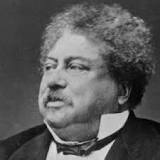The Count of Monte Cristo Page #20
The Count of Monte Cristo is an adventure novel by French author Alexandre Dumas completed in 1844. It is one of the author's most popular works, along with The Three Musketeers.
“None at all. I will tell you the real facts. I swear by my honor as a sailor, by my love for Mercédès, by the life of my father——” “Speak, monsieur,” said Villefort. Then, internally, “If Renée could see me, I hope she would be satisfied, and would no longer call me a decapitator.” “Well, when we quitted Naples, Captain Leclere was attacked with a brain fever. As we had no doctor on board, and he was so anxious to arrive at Elba, that he would not touch at any other port, his disorder rose to such a height, that at the end of the third day, feeling he was dying, he called me to him. ‘My dear Dantès,’ said he, ‘swear to perform what I am going to tell you, for it is a matter of the deepest importance.’ “‘I swear, captain,’ replied I. “‘Well, as after my death the command devolves on you as mate, assume the command, and bear up for the Island of Elba, disembark at Porto- Ferrajo, ask for the grand-marshal, give him this letter—perhaps they will give you another letter, and charge you with a commission. You will accomplish what I was to have done, and derive all the honor and profit from it.’ “‘I will do it, captain; but perhaps I shall not be admitted to the grand-marshal’s presence as easily as you expect?’ “‘Here is a ring that will obtain audience of him, and remove every difficulty,’ said the captain. At these words he gave me a ring. It was time—two hours after he was delirious; the next day he died.” “And what did you do then?” “What I ought to have done, and what everyone would have done in my place. Everywhere the last requests of a dying man are sacred; but with a sailor the last requests of his superior are commands. I sailed for the Island of Elba, where I arrived the next day; I ordered everybody to remain on board, and went on shore alone. As I had expected, I found some difficulty in obtaining access to the grand-marshal; but I sent the ring I had received from the captain to him, and was instantly admitted. He questioned me concerning Captain Leclere’s death; and, as the latter had told me, gave me a letter to carry on to a person in Paris. I undertook it because it was what my captain had bade me do. I landed here, regulated the affairs of the vessel, and hastened to visit my affianced bride, whom I found more lovely than ever. Thanks to M. Morrel, all the forms were got over; in a word I was, as I told you, at my marriage feast; and I should have been married in an hour, and tomorrow I intended to start for Paris, had I not been arrested on this charge which you as well as I now see to be unjust.” “Ah,” said Villefort, “this seems to me the truth. If you have been culpable, it was imprudence, and this imprudence was in obedience to the orders of your captain. Give up this letter you have brought from Elba, and pass your word you will appear should you be required, and go and rejoin your friends. “I am free, then, sir?” cried Dantès joyfully. “Yes; but first give me this letter.” “You have it already, for it was taken from me with some others which I see in that packet.” “Stop a moment,” said the deputy, as Dantès took his hat and gloves. “To whom is it addressed?” “To Monsieur Noirtier, Rue Coq-Héron, Paris.” Had a thunderbolt fallen into the room, Villefort could not have been more stupefied. He sank into his seat, and hastily turning over the packet, drew forth the fatal letter, at which he glanced with an expression of terror. “M. Noirtier, Rue Coq-Héron, No. 13,” murmured he, growing still paler. “Yes,” said Dantès; “do you know him?” “No,” replied Villefort; “a faithful servant of the king does not know conspirators.” 0103m “It is a conspiracy, then?” asked Dantès, who after believing himself free, now began to feel a tenfold alarm. “I have, however, already told you, sir, I was entirely ignorant of the contents of the letter.” “Yes; but you knew the name of the person to whom it was addressed,” said Villefort. “I was forced to read the address to know to whom to give it.” “Have you shown this letter to anyone?” asked Villefort, becoming still more pale. “To no one, on my honor.” “Everybody is ignorant that you are the bearer of a letter from the Island of Elba, and addressed to M. Noirtier?” “Everybody, except the person who gave it to me.” “And that was too much, far too much,” murmured Villefort. Villefort’s brow darkened more and more, his white lips and clenched teeth filled Dantès with apprehension. After reading the letter, Villefort covered his face with his hands. “Oh,” said Dantès timidly, “what is the matter?” Villefort made no answer, but raised his head at the expiration of a few seconds, and again perused the letter. “And you say that you are ignorant of the contents of this letter?” “I give you my word of honor, sir,” said Dantès; “but what is the matter? You are ill—shall I ring for assistance?—shall I call?” “No,” said Villefort, rising hastily; “stay where you are. It is for me to give orders here, and not you.” “Monsieur,” replied Dantès proudly, “it was only to summon assistance for you.” “I want none; it was a temporary indisposition. Attend to yourself; answer me.” Dantès waited, expecting a question, but in vain. Villefort fell back on his chair, passed his hand over his brow, moist with perspiration, and, for the third time, read the letter. “Oh, if he knows the contents of this!” murmured he, “and that Noirtier is the father of Villefort, I am lost!” And he fixed his eyes upon Edmond as if he would have penetrated his thoughts. “Oh, it is impossible to doubt it,” cried he, suddenly. “In heaven’s name!” cried the unhappy young man, “if you doubt me, question me; I will answer you.” Villefort made a violent effort, and in a tone he strove to render firm: “Sir,” said he, “I am no longer able, as I had hoped, to restore you immediately to liberty; before doing so, I must consult the trial justice; what my own feeling is you already know.” “Oh, monsieur,” cried Dantès, “you have been rather a friend than a judge.” 0105m “Well, I must detain you some time longer, but I will strive to make it as short as possible. The principal charge against you is this letter, and you see——” Villefort approached the fire, cast it in, and waited until it was entirely consumed. “You see, I destroy it?” “Oh,” exclaimed Dantès, “you are goodness itself.” “Listen,” continued Villefort; “you can now have confidence in me after what I have done.” “Oh, command, and I will obey.” “Listen; this is not a command, but advice I give you.” “Speak, and I will follow your advice.” “I shall detain you until this evening in the Palais de Justice. Should anyone else interrogate you, say to him what you have said to me, but do not breathe a word of this letter.” “I promise.” It was Villefort who seemed to entreat, and the prisoner who reassured him. “You see,” continued he, glancing toward the grate, where fragments of burnt paper fluttered in the flames, “the letter is destroyed; you and I alone know of its existence; should you, therefore, be questioned, deny all knowledge of it—deny it boldly, and you are saved.”
Translation
Translate and read this book in other languages:
Select another language:
- - Select -
- 简体中文 (Chinese - Simplified)
- 繁體中文 (Chinese - Traditional)
- Español (Spanish)
- Esperanto (Esperanto)
- 日本語 (Japanese)
- Português (Portuguese)
- Deutsch (German)
- العربية (Arabic)
- Français (French)
- Русский (Russian)
- ಕನ್ನಡ (Kannada)
- 한국어 (Korean)
- עברית (Hebrew)
- Gaeilge (Irish)
- Українська (Ukrainian)
- اردو (Urdu)
- Magyar (Hungarian)
- मानक हिन्दी (Hindi)
- Indonesia (Indonesian)
- Italiano (Italian)
- தமிழ் (Tamil)
- Türkçe (Turkish)
- తెలుగు (Telugu)
- ภาษาไทย (Thai)
- Tiếng Việt (Vietnamese)
- Čeština (Czech)
- Polski (Polish)
- Bahasa Indonesia (Indonesian)
- Românește (Romanian)
- Nederlands (Dutch)
- Ελληνικά (Greek)
- Latinum (Latin)
- Svenska (Swedish)
- Dansk (Danish)
- Suomi (Finnish)
- فارسی (Persian)
- ייִדיש (Yiddish)
- հայերեն (Armenian)
- Norsk (Norwegian)
- English (English)
Citation
Use the citation below to add this book to your bibliography:
Style:MLAChicagoAPA
"The Count of Monte Cristo Books." Literature.com. STANDS4 LLC, 2024. Web. 25 Nov. 2024. <https://www.literature.com/book/the_count_of_monte_cristo_34>.




Discuss this The Count of Monte Cristo book with the community:
Report Comment
We're doing our best to make sure our content is useful, accurate and safe.
If by any chance you spot an inappropriate comment while navigating through our website please use this form to let us know, and we'll take care of it shortly.
Attachment
You need to be logged in to favorite.
Log In